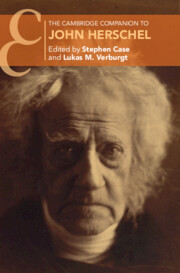Book contents
- The Cambridge Companion to John Herschel
- The Cambridge Companion to John Herschel
- Copyright page
- Contents
- Figures
- Contributors
- Acknowledgments
- Chronology
- Introduction
- 1 John Herschel
- 2 The Mathematical Journey of John Herschel
- 3 John Herschel’s Astronomy
- 4 Stargazer at World’s End
- 5 Herschel’s Philosophy of Science
- 6 Drawing Observations Together
- 7 Photology, Photography, and Actinochemistry
- 8 Herschel’s Planet
- 9 John Herschel and Scientific Standardization
- 10 John Herschel and Politics
- 11 John Herschel’s Methodology in the Scientific Community
- Further Reading
- Index
1 - John Herschel
A Biographical Sketch
Published online by Cambridge University Press: 08 May 2024
- The Cambridge Companion to John Herschel
- The Cambridge Companion to John Herschel
- Copyright page
- Contents
- Figures
- Contributors
- Acknowledgments
- Chronology
- Introduction
- 1 John Herschel
- 2 The Mathematical Journey of John Herschel
- 3 John Herschel’s Astronomy
- 4 Stargazer at World’s End
- 5 Herschel’s Philosophy of Science
- 6 Drawing Observations Together
- 7 Photology, Photography, and Actinochemistry
- 8 Herschel’s Planet
- 9 John Herschel and Scientific Standardization
- 10 John Herschel and Politics
- 11 John Herschel’s Methodology in the Scientific Community
- Further Reading
- Index
Summary
John Herschel grew up in a world of intense scientific activity. From an early age, he was surrounded by examples of science in action. His education was supplemented at every stage to ensure exposure to and training in the highest, most up-to-date mathematics. At the same time, John also experienced an indirectly political upbringing, one that showed him not only a changing world but also the power of education to challenge and change tradition. The politics he witnessed growing up illustrated dramatic transformations taking place in England and abroad. Family friends were caught up in the aftermath of the French Revolution. In England, family holidays and changing consumer tastes evidenced the effects of England’s industrial revolution. In adulthood, these two strands – the scientific and the political – influenced his outlook and choices. He chose friends at university, such as Charles Babbage (1791–1871) and George Peacock (1791–1858), who wanted to change the world through mathematics. He attempted to earn a living from natural philosophy rather than train for the church or fall back on family wealth after graduation as his father wished. He chose to marry an evangelical free thinker, keen to use knowledge and religion to improve the lives of others. He chose to never completely pursue science in isolation but instead advise governments both in South Africa and in England on using science to improve education and society. He chose to train his children to be both scientifically curious and socially minded. These choices shaped Herschel’s life.
- Type
- Chapter
- Information
- The Cambridge Companion to John Herschel , pp. 12 - 34Publisher: Cambridge University PressPrint publication year: 2024



